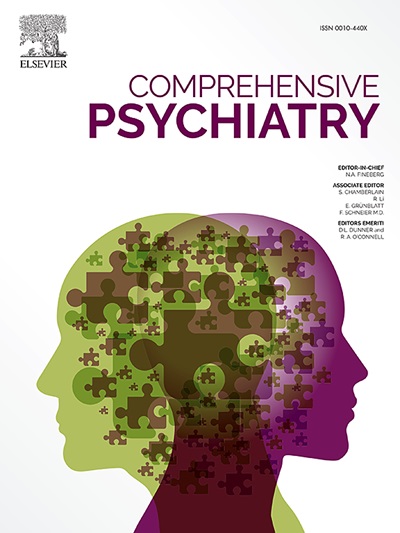边缘型人格障碍患者最初表现为心理生理放松水平降低,但放松反应完整
IF 4.2
2区 医学
Q1 PSYCHIATRY
引用次数: 0
摘要
边缘型人格障碍(BPD)与患者的心理和生理失调有关,包括基线时副交感神经活动减少和应激源后难以恢复到基线。这是否会影响独立于压力源的松弛反应,目前还没有研究。方法在受试者内设计中,我们比较了两种放松干预,一种虚拟现实自然视频和一种节奏呼吸干预。我们评估了一个女性样本,20名BPD患者(平均= 23.75±4.39)在住院治疗期间和22名匹配的健康对照(HC;平均值= 22.68±2.68)。采用松弛状态问卷(RSQ)评估心理松弛,采用迷走神经介导的心率变异性(HRV)评估生理松弛。结果采用多水平模型检验BPD是否显著影响心理生理放松反应。对于心理放松,我们发现两组的RSQ分数在两种干预措施的反应中都有所增加。HC的RSQ得分总体较高。对于生理松弛,我们发现HC组的HRV值总体较高,但松弛反应没有差异。结论bpd患者在基线和整个实验过程中表现出较低的心理生理放松水平,而与HC相比,bpd患者对放松干预的反应无显著差异。未来的研究应侧重于BPD患者基线心理生理放松的干预措施。本文章由计算机程序翻译,如有差异,请以英文原文为准。
Patients with borderline personality disorder show initially reduced psychophysiological relaxation levels but intact relaxation response
Introduction
Borderline Personality Disorder (BPD) is associated with psychological as well as physiological dysregulation in patients, including reduced parasympathetic activity at baseline and difficulties returning to baseline after a stressor. Whether this impacts the relaxation response independent of a stressor has so far not been investigated.
Methods
In a within-subject design, we compared two relaxation interventions, a virtual reality nature video, and a paced breathing intervention. We assessed a female-only sample, with 20 BPD patients (meanage = 23.75 ± 4.39) during their inpatient treatment and 22 matched healthy controls (HC; meanage = 22.68 ± 2.68). Psychological relaxation was assessed with the Relaxation State Questionnaire (RSQ) and physiological relaxation with vagally mediated heart rate variability (HRV).
Results
We employed multilevel models to test whether BPD significantly influenced the psychophysiological relaxation response. For psychological relaxation, we found an increase in RSQ scores in both groups in response to both interventions. The HC showed overall higher RSQ scores. For physiological relaxation, we found overall higher HRV values in the HC group but no differences in the relaxation response.
Conclusion
BPD patients exhibit lower psychophysiological relaxation levels at baseline and throughout the experiment, while there was no significant difference in response to relaxation interventions when compared to HC. Future studies should focus on interventions targeting baseline psychophysiological relaxation in BPD patients.
求助全文
通过发布文献求助,成功后即可免费获取论文全文。
去求助
来源期刊

Comprehensive psychiatry
医学-精神病学
CiteScore
12.50
自引率
1.40%
发文量
64
审稿时长
29 days
期刊介绍:
"Comprehensive Psychiatry" is an open access, peer-reviewed journal dedicated to the field of psychiatry and mental health. Its primary mission is to share the latest advancements in knowledge to enhance patient care and deepen the understanding of mental illnesses. The journal is supported by a diverse team of international editors and peer reviewers, ensuring the publication of high-quality research with a strong focus on clinical relevance and the implications for psychopathology.
"Comprehensive Psychiatry" encourages authors to present their research in an accessible manner, facilitating engagement with clinicians, policymakers, and the broader public. By embracing an open access policy, the journal aims to maximize the global impact of its content, making it readily available to a wide audience and fostering scientific collaboration and public awareness beyond the traditional academic community. This approach is designed to promote a more inclusive and informed dialogue on mental health, contributing to the overall progress in the field.
 求助内容:
求助内容: 应助结果提醒方式:
应助结果提醒方式:


